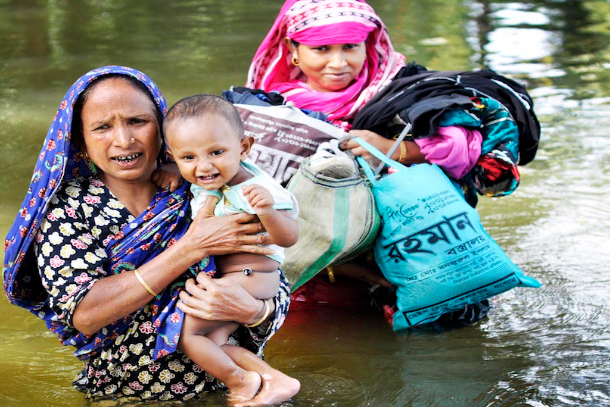In Bangladesh alone, 134 million people face reduced living standards in the coming decades, report says

Women wade through floodwater in southern Jessore district on Aug. 22, 2016. Climate scientists say frequent natural disasters like cyclones and flooding have an economic cost. (Photo by Stephan Uttom/ucanews.com)
Half of South Asia — including 134 million people in Bangladesh — face declining living standards as a result of rising temperatures and erratic rainfall, a World Bank report has warned.
The severe climate changes in the coming decades could result in a fall in agricultural and labor productivity and a rise in the spread of mosquito-borne and other infectious diseases, the report said.
The “South Asia’s Hotspots: Impacts of Temperature and Precipitation Changes on Living Standards” report released Sept. 26, said in the last 60 years the region’s average temperatures have increased and will continue to rise.
In Bangladesh, about three-quarters of the 165 million population will face reduced living standards due to a loss of seven percent of Gross Domestic Product (GDP) by 2050, it said.
Bangladesh’s average temperature is predicted to increase by 1-1.5 Celsius by 2050 even if preventive measures recommended by the 2015 Paris climate change agreement are undertaken. If no measures are taken, the country’s average temperatures are predicted to increase by as much as 2.5 Celsius, the report stated.
“Around the world, and especially for Bangladesh, climate change is an acute threat to development and efforts to end poverty,” said Hartwig Schafer, World Bank vice-president for South Asia. “In addition to the coastal zones, the warming weather will severely effect the country’s inland area in the next decades. To deal with climate change, the country needs to focus on creating jobs outside the agriculture sector and improve the capacity of its government institutions.”
The damage from climate change would be greater than the report predicted, warned Sharif Jamil, joint secretary of the environmental group Bangladesh Poribesh Andolon (BAPA).
“The report is based on current data and it is not extensive and expansive enough. The government has taken measures for industrialization for alternative sources of income, but in an erratic manner, which in fact contributes to global warming,” Jamil told ucanews.com.
Bangladesh generates two percent of its power from coal plants, but the government plans to gradually increase this to 30 percent, which would only further damage the environment, he warned.
“Everyone knows Bangladesh is one of the most vulnerable countries for climate change, but it gets dismal financial support from the global climate change fund. On the other hand, we lack competence in governance, planning and implementation to utilize the funds. The World Bank report must be taken seriously by all quarters,” Jamil further added.
Augustine Baroi, senior manager of Ecological Conservation and Development Project at Caritas Bangladesh, agreed that the bleak forecast for climate change would be disastrous for the country.
“Two recent cyclones — Sidr (2007) and Aila (2009) — had devastating impacts on the lives and livelihoods of people in the southern coastal region. Now we see sea water inundating more areas than before. In the north, heat waves and reduced rainfall are causing drought and desertification,” Baroi said.
Solaiman Haider, a director of the Environment Department, said the government had already taken measures to minimize the impact of climate change.
“We have undertaken various projects on climate change adaption, mitigation and human resource development. We are focusing strongly on governance, capacity building, alternative livelihoods and biodiversity management and preservation. The World Bank report is a warning and the government is responding well,” Haider said.

